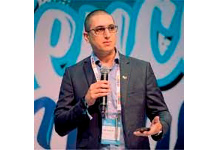Driving Transformation Inside Out: The Next Generation of Fund Administrators

- Ed Gouldstone, Head of Product Management, Asset Management at Linedata
- 20.07.2022 12:30 pm #Digital #Transformation
Millennials and Gen Z have been widely covered over the last few years as the beneficiaries of the incoming ‘wealth transfer’ from baby boomers, framed as setting young people up as a fresh set of keen investors looking to maximise their wealth. More digitally savvy than any previous generation, much discussion has revolved around how to appeal to them by digitising the front office, providing clever and personalised data insights and interactive platforms such as robo-advisers. But these generations aren’t just making up an increasing percentage of investors.
The working Millennial
By 2025, Millennials could comprise 75% of the global workforce, according to a report by EY. For the asset management and alternative funds industries, it is hard to overstate the effect this younger workforce will have on operations. Their impact will be driven by factors such as a lower tolerance for manual, paper-based work and a deeper interest in environmental, social and governance (ESG) financial products than any previous generation. This is especially true for Gen Z—the oldest of which turn 24 this year. Corporate social responsibility (CSR) and ESG factor heavily into their decision-making, including where to work.
Impatience is a virtue
They may have been dubbed the “impatient generations”, not only because of their ambitiousness in the workplace—over 90% desire ‘rapid career progression’ according to a human resources survey—but also thanks to their appetites as consumers and investors. They are highly likely (almost 40%) to abandon online banking onboarding procedures that feel too lengthy, for example. But these ‘impatient’ generations shouldn’t be perceived as a risk for the industry. Whether they are end investors or predominating the workforce, we should embrace their optimism, social consciousness and desire for automation – and let it transform operations.
The pressure to transform
The fund administration business is in some ways still behind the curve. But the current market climate and pandemic-triggered recession have left many fund administrators needing to do even more with less, while the bar to remain competitive keeps rising. Market consolidation is at a fever pitch, coexisting with fragmentation in the industry, while regulatory pressure is increasing costs and market pressure is reducing the margins that fund administrators can charge. Investment products are becoming more complex than ever, as are client demands, especially from alternative investment funds. To top it off, with the heightened emphasis on transparency, monthly or quarterly reports are no longer good enough.
As a result, the use of web portals as a means of data and report delivery, as well as transaction processing and self-service, is on the increase. As the industry emerges from Covid-19’s trial by fire, fund administrators must be nimbler than ever and embrace a broad range of technological innovations, including cloud-based applications, APIs, artificial intelligence and machine learning. Cloud, in particular, is fundamental in allowing employees to adopt new flexible working cultures brought into play by Covid, which have been embraced by younger employees. According to Deloitte, 25% of Millennials and 22% of Gen Z’s said they would like to work in the office “a little to a lot less often” than before the pandemic.
The value of technology
Better use of technology by administrators will empower a Millennial and Gen Z-dominated workforce which values automated workflows, data and analytics. Fund administrators aiming to retain their best and brightest need to ensure that such employees are in interesting roles that make them feel that they are contributing, collaborating, and learning. And, the global workforce is still poised for an influx of younger data scientists, who will be looking for innovative industries to test their skills in and opportunities to build on these using cutting-edge technology.
Embracing the digital native
Fund administrators should explore how tech can further optimise back-office operations, reduce operational risk, empower remote workforces and attract the next generation of data scientists. The pace of innovation – while breath-taking at times – is still slower than it will be at any stage in the future. So, whether they are your end investors or an increasing presence in your workforce, these generations of digital natives are poised to transform the financial industry from front to back office.























